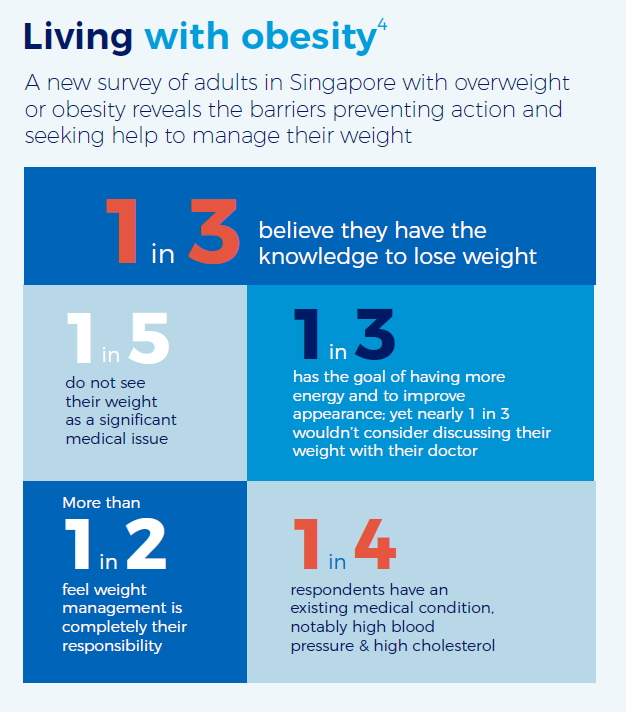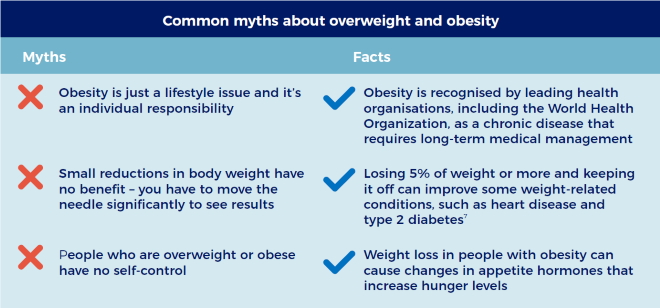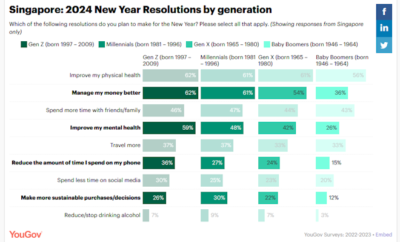
Health x Wellness
‘Your Weight Can’t Wait’ campaign recognises obesity as medical condition
The Singapore Association for the Study of Obesity (SASO) and Novo Nordisk have launched the ‘Your weight can’t wait’ campaign that seeks to increase knowledge of obesity as a complex and long-term medical condition
The ‘Your weight can’t wait’ campaign is anchored by a website – www.yourweightcantwait.sg – that will provide people with obesity and their families tools and information, that can complement the advice of a healthcare professional.
One of the goals of this awareness campaign is to encourage overweight and obese people to urgently seek more information from trained healthcare professionals. These professionals can help provide informatio about weight management options that can help to lose weight and keep it off.

Linked to the campaign, a recent survey of people with overweight and obesity in Singapore was commissioned by SASO and conducted by research partner YouGov. Survey highlights include:
- A majority of survey respondents recognise they have an issue with their weight and intend to take action; however they are not actively seeking professional help.
- One out of two respondents have the goal of losing weight; yet nearly one out of three would not consider discussing it with their doctor.
- Many respondents (about one out of three) have not discussed their excess weight or losing weight with their doctors in the past 5 years.
- The primary reason for not discussing their weight with a doctor is because respondents believe that it’s their responsibility alone to manage.
- None of our respondents feel that their doctors have that responsibility.
- The most common method that respondents tried was to improve their eating habits and diet as well as exercise with a tracking app to keep track of their progress.
- For those that did have a discussion with their doctor, only 5 percent followed their doctor’s suggestions successfully; 37 percent were somewhat successful and another 32 percent stopped following the suggestions.

We had a discussion with Dr. Tham Kwang Wei, President, SASO about the campaign, survey highlights and reasons why people might find it challenging to open up to their doctors.
the Active Age (AA): From a health and medical perspective, what are the key considerations obese people need to be made aware of?
Dr. Tham Kwang Wei (TKW): It is important to highlight that obesity is beyond just a weight issue, beyond a physical or cosmetic issue. It is a medical condition much like hypertension, type 2 diabetes and heart disease with causes, classifications, known complications, systematic treatment and preventive approaches.
As a matter of fact, it is akin to a silent killer as it wreaks havoc and racks up one’s risk for a whole host of other serious medical problems and it reduces one’s life expectancy and quality of life. It is a chronic condition therefore it will be unreasonable to expect someone with excess weight to shed it all in a matter of weeks or months especially when one has lived with it for many years.
What is different about obesity from other better understood medical conditions is that many people, layman and medical professionals alike, still view it as a cosmetic problem or a result of deliberate poor lifestyle choices when there are many factors involved.
These create barriers to people getting the help they need and also others around them to better support them.
There have been many advances made in the understanding of obesity and its management and treatment options. So, just as how we would not feel afraid or hesitant to seek professional advice if and when diagnosed with diabetes or hypertension or any other medical condition, so it should be with obesity especially when one has been struggling to manage it and keep the weight off for long-term.
Even if you are not keen to see a doctor to get medical treatment to lose weight, you can and should get a general health screening for conditions that are highly associated with overweight or obesity like high blood pressure, high blood sugar, abnormal cholesterol levels and fatty liver.
AA: From your experience, why do you think people find it difficult to have the weight management conversation with their doctor? Is it a lack of information, cultural or just embarrassment?
TKW: I think it is all. I share my experience here both as a specialist who has been managing patients with obesity for 20 years and also as someone who used to be overweight and obese from childhood till much of my adulthood.
There is just so much weight stigma and bias in the society and in our culture especially in the 70s and 80s when not many people were overweight or obese then.
Even comments like, “oh, you have put on weight again or wow, you can eat huh?” may sound like benign statements but they pierce one’s heart each time one hears it.
Honestly, it’s not easy to control one’s hunger especially when going on a diet which people who are overweight or living with obesity (PwO) would have tried multiple times. It is tiring and frustrating to carry all that extra weight too. Not being able to wear the clothes one likes especially for the ladies is another negative stigmatizing message from society.
In the workplace, PwO also suffer from discrimination esp. when applying for a job. Friends and family who do not understand one’s struggles or obesity as a medical condition (with large genetic, environmental, psychosocial triggers/aggravators) often label PwOs as lazy or ill-disciplined or simply not doing enough to help oneself.
So, growing up or just living in an environment when being skinny is the gold standard of beauty or value, one’s self-esteem and confidence can get affected and also be made to feel guilty to be of a certain weight despite feeling helpless at the same time.
All these values and negative feelings get internalised in people and that weight bias and stigma from within and without further compounds the problem – quietly suffering by oneself, trying over-the-counter products or unproven methods or just not seeking help at all, much less talk to a doctor.
We don’t see that happening to people who have hypertension, diabetes or heart disease – being blamed for being lazy or having less desirable lifestyles to have brought that condition upon themselves.
Lack of information and understanding on the condition can be a factor too. Seeing that it is solely their own responsibility to manage their weight instead of getting support from healthcare professionals often drive people to try out various things which may not be scientifically proven.
There are also times when healthcare professionals are not understanding or sensitive towards PwO. Instead of extending empathy or help to the patients, they may blame the patient for not making enough effort or make negative comments which might make the patients more fearful to seek help.
Not recognizing obesity as a chronic condition and understanding its mechanisms and causes can result in inadequate treatment.

AA: What outcomes are you hoping the ‘Your weight can’t wait’ campaign will achieve in terms of changing mindsets?
TKW: As obesity and being overweight is a very common condition in Singapore now, we hope that everyone can better understand this condition and keep an open mind set just as how they would with other medical conditions. It is not as benign a condition and goes beyond just physical weight and looks.
We are not saying everyone needs to seek professional help to be successful in their weight loss journey but at least, see a doctor for a proper health assessment, understand the condition better and give yourself options which have been scientifically tried and tested.
This campaign is not just for those struggling or living with obesity but for everyone. We may not necessarily carry excess weight or live with the effects of such but may have family, friends, colleagues or employees who do.
And they need our support and understanding in order to take that step to make a change, towards a healthier lifestyle and self. We have a big part to play to create a healthier lifestyle for all around us.
Couples planning to have children especially women also play a big role in determining their children’s health – a whole next generation.
At a public health level, we also hope that reimbursements for obesity treatment will improve as views of obesity as a chronic disease are adopted and more people can benefit from having better access to medical care and treatment. It will save more dollars in the long-term if we prevent the costly chronic diseases associated with obesity.
The roots of obesity are multiple and complex so with this campaign, we healthcare professionals are calling upon everyone to continue to understand and tackle the roots of obesity, for a better health for many Singaporeans.
Infographic provided by SASO and Novo Nordisk









